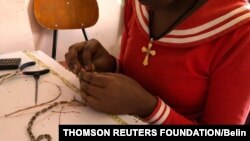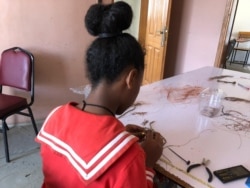From ex-prostitutes making jewelry out of bullet casing to drones delivering blood, rising numbers of businesses with a mission to help address social problems are emerging in Ethiopia as the economy opens up.
An estimated 55,000 social enterprises operate in Ethiopia, the second-most populous country in Africa and fastest growing economy in the region where about a quarter of 109 million people live below the poverty line, according to the World Bank.
But the number of ventures set up to do good is on the rise since Prime Minister Abiy Ahmed came in 18 months ago and vowed to open the economy to private investment, raising hopes of official recognition for the sector and easier access to funds.
Kibret Abebe, one of Ethiopia's best-known social entrepreneurs, said the sector would be boosted as Ethiopia hosts the 12th annual Social Enterprise World Forum (SEWF) this week, the first developing country to do so.
"The economy is opening up and we are seeing more social enterprises in Ethiopia," said Abebe, first president of Social Enterprise Ethiopia, which was set up last year to advance firms set up to do good that re-invest their profits into their work.
"Scaling up has been a nightmare in Ethiopia and it's been hard to collaborate with the government but I'm optimistic this will change as we have a lot of social problems to fix."
Ethiopia's Education Minister Tilaye Gete said hosting SEWF, attended by more than 1,200 delegates from 50 or so countries, was a sign of change under Ahmed, who was awarded the Nobel Peace Prize earlier this month.
"This is reflective of the overall change in leadership and mindset across the country," said Gete as he officially opened the three-day conference.
Abebe, an anaesthetist, was a trailblazer for social enterprise in Ethiopia when he sold his house to set up TEBITA Ambulance more than a decade ago after seeing how many road accident victims struggled to get transport to medical help.
TEBITA now runs a fleet of 20 ambulances and a college training paramedics, funding its work by charging patients for journeys, offering training, as well as providing emergency services for the national football team.
Health to Housing
Abebe said TEBITA was one of thousands of social enterprises in Ethiopia aiming to help the most needy, with newcomers focused on agriculture, education, health, housing and IT.
For example Maisha Technologies PLC is a tech-based social enterprise testing advanced drones to deliver blood to health centers in rural areas where half of maternal deaths occur.
HelloSolar aims to provide rural communities without electricity with off-grid energy and affordable payment plans.
Abebe said young people - with 43% of the population aged 15 or under - were playing a key role in advancing new social enterprises, many with tech solutions and hoping to create jobs for the future.
A 2016 survey by the British Council - which co-hosts SEWF with local partners - estimated the number of social enterprises in Ethiopia and found about half were led by people aged under 35 while women led more than a quarter of social enterprises.
But these firms reported numerous challenges, including the lack of a policy framework with no distinct formal legal form or recognized means to register as social enterprises in Ethiopia.
The biggest barrier, however, was found to be financial - accessing capital or obtaining grants - so it was critical to find a revenue stream and one strong enough to support growth.
Ellilta Products, for example, was set up 2012 to support sister organization, Ellilta Women at Risk (EWAR), founded in 1995 to help break the generational cycle of prostitution.
Headquartered on the outskirts of Addis Ababa, Ellilta Products' workforce of about 55 includes former prostitutes making jewelry from bullet casing and scarves and soaps that are sold locally and overseas to fund the work of EWAR.
EWAR workers visit red light areas in Addis Ababa to encourage women to join a year-long rehabilitation program of counselling and training while their children go to school.
Ellilta Products' General Manager Emnet Mersha Seyoum said so far EWAR has rescued around 1,000 women, with a success rate of 90% not returning to prostitution.
Anchilu Alemu, aged about 50, said she was rescued nine years ago after 18 years as a prostitute and this has given her and her daughter a new life. She makes scarves at Ellilta and her daughter went to college and is now married with a child.
"Before prostitution was the only way I could make money. This saved me," she said as she pulled at a spool of yarn.
Seyoum said it had been hard to get funding in Ethiopia as the government did not recognize or understand social enterprises but she hoped this would change under Ahmed and with the SEWF in Addis, attended by 1,200 people from 58 nations.
"Ideally in the future we want to scale up to grow tenfold so that we can provide jobs to all of the women that we rescue," she told the Thomson Reuters Foundation.






